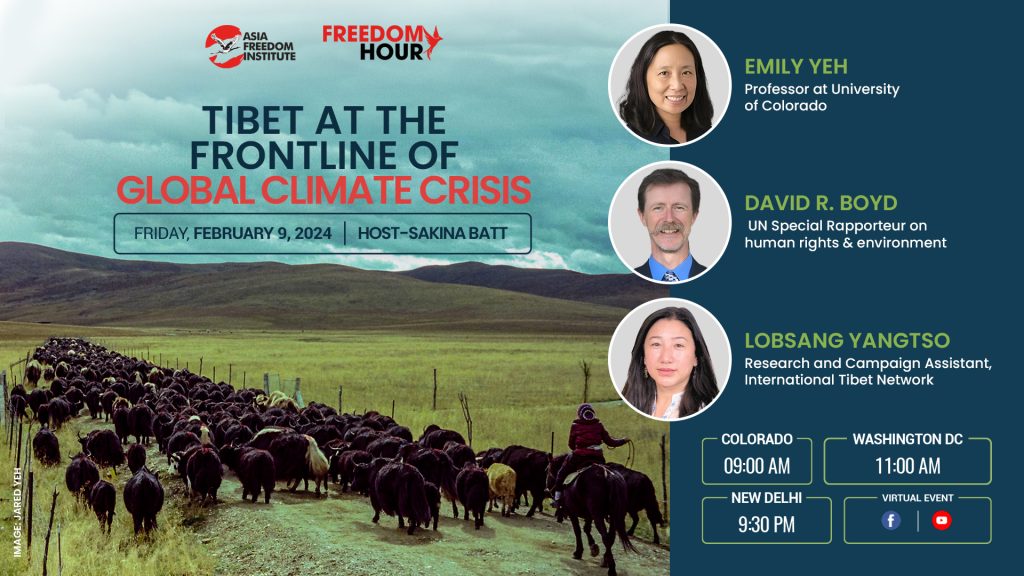Tibet is at the frontline of climate change with temperatures rising three times higher than the global average. Known as the Earth’s Third Pole, the vast Tibetan plateau holds the largest reserve of freshwater outside the Arctic and provides water for over 1.4 billion people. The plateau’s critical ecosystem impacts regional and global weather patterns and the region’s rich biodiversity. The delicate balance that Tibetans have historically maintained as stewards of the environment and the fragile ecosystem has been upended with the invasion and occupation of Tibet by the People’s Republic of China (PRC) and the policies of the Chinese government. What are the environmental and climate challenges in Tibet and their implications for people in Tibet and globally? How have Chinese government policies exacerbated the climate and environmental crisis in Tibet? What actions can be taken?
Date: Friday, February 9, 2024
Time: 9:00 am (Colorado). 11:00 am (Washington DC). 8:30 pm (New Delhi)
Event Type: Virtual (YouTube and Facebook)
Participants:
| Emily Yeh
Professor, University of Colorado |
David R. Boyd
UN Special Rapporteur on Human Rights and Environment |
| Lobsang Yangtso
Research and Campaign Assistant, |
Moderator:
Sakina Batt
Host, Freedom Hour, AFI
Streaming Links:
Facebook: https://www.facebook.com/AsiaFreedomInstitute
YouTube: https://www.youtube.com/@AsiaFreedomInstitute/streams
BIOGRAPHIES
Emily Yeh
Emily Yeh is a professor of Geography at the University of Colorado. Her main research interests are on questions of power, political economy, and cultural politics in the nature-society relationship. Using primarily ethnographic methods, Emily has conducted research on property rights, natural resource conflicts, environmental history, development and landscape transformation, grassland management and environmental policies, and emerging environmentalisms in Tibetan areas of China. In addition, she has also worked on the politics of identity and race in the Tibetan diaspora, and on several NSF-funded interdisciplinary, collaborative projects on putative causes of rangeland degradation and vulnerability to climate change on the Tibetan Plateau. Broader research and teaching interests include transnational conservation, critical development studies, the relationship between nature, territory, and the nation, and environmental justice. Her regional expertise is in China, Tibet, and the Himalayas.
David R. Boyd
David R. Boyd is recognized for his influential role as the United Nations Special Rapporteur on human rights and the environment, a position he has held since 2018. He is also an associate professor of law, policy, and sustainability at the University of British Columbia. Mr. Boyd has a PhD in Resource Management and Environmental Studies from UBC, a law degree from the University of Toronto, and a business degree from the University of Alberta. His career has included serving as the executive director of Ecojustice, appearing before the Supreme Court of Canada, and working as a special advisor on sustainability for Canadian Prime Minister Paul Martin. He has advised many governments on environmental, constitutional, and human rights policy and co-chaired Vancouver’s effort to become the world’s greenest city by 2020. He is a member of the World Commission on Environmental Law, an expert advisor for the UN’s Harmony with Nature Initiative, and a member of ELAW, the Environmental Law Alliance Worldwide. Mr. Boyd is also the author of nine books and over 100 reports and articles on environmental law and policy, human rights, and constitutional law.
Lobsang Yangtso
Lobsang Yangtso is a Research and Campaign Assistant to Tibet Third Pole, International Tibet Network. In the past, she worked as a Research Associate at the Centre for China Analysis and Strategy, New Delhi, and interned at the Environment and Development Desk of Tibet Policy Institute, CTA Dharamsala. She has contributed immensely in shaping the agenda and discourse around the subjects on China-Tibet dialogue. As an academic invested in research and studies, Ms. Lobsang has published articles in various journals on her work. She has also participated in and presented many papers at international/national seminars and conferences. She went to Jawaharlal Nehru University, Delhi for M.Phil in Chinese Studies, at the Centre for East Asian Studies, followed by Ph.D studies at the same University. Recently Ms. Yangtso successfully submitted her Ph.D thesis on “China’s Environmental Security Policies in Tibet: Implications to India, 2001-2013”.
Sakina Batt
Sakina Batt is a Producer and Director at Meeting Point, a leading audio-visual production house and buying agency in Nepal. She directs promotional videos, does voice overs, writes scripts and copywriting for the videos in Meeting Point. Sakina worked for Tibet TV at the Central Tibetan Administration in India for four years (2017-2021) where she served as a news presenter and an interview host. She also made short documentaries for the channel, wrote scripts, conducted research, edited videos and anchored the show In Conversation with Tibet TV. Sakina has a Masters in Mass Communication from Jamia Millia Islamia, New Delhi and a bachelors from Delhi University.


